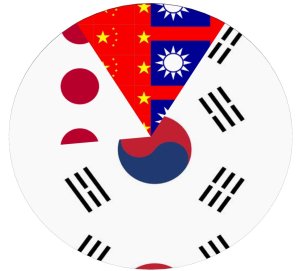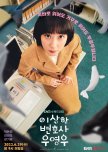NOT extraordinary, not awful
I hesitated about watching this drama for a long time, in the end it was neither as good as I hoped it would be nor as bad as it could have been.
One of the biggest problems I have with Extraordinary Attorney Woo is the way it infantilises and fantasises autism. I have no problem with the presentation of an autistic person who has an idiosyncratic speaking style, but the presentation of attorney Woo's speech is that it seems designed to be cutesy, and that was to be a problem with the entire presentation of her autism.
I cut the drama some slack for that because I know that Korea is an extremely ableist society. It demonises the different, and it may well be that the drama decided to present the attorney as a cute overgrown infant at least in part in order to overcome the deeply ingrained antipathy toward the different in Korea's extremely homogenous society. Nevertheless, it got very wearing. The intent may have been noble, but the effect it was, for me, counter-productive. Presenting her as “a genius fairy” was demeaning, and even her display of the characteristics of her autism was inconsistent.
Similarly I am fine with the idea that attorney Woo has cetaceans as her special interest. One of my best friends is on the spectrum and his special interest is Koine Greek grammar – his brother, further on the spectrum, has superhero comics as his special interest. Both display the same sort of devotion to their interest she does to cetaceans.
But again the presentation of her special interest was infantile and fantasised. Not in the fact that she always wanted to talk about them, that would be normal, but the whole fantasy element of her "Eureka!" Moments involving various cetaceans floating through a field of vision was disappointing for me. Disappointing because it suggested again that she somehow lived in a fantasy world , not like a normal human being .
That fantasy world was also evident in many of the cases. One of the worst examples was in episode nine, involving the "kidnapping" of the children from the Academy bus. Like the kidnapper, I find the whole concept of forcing children to effectively spend 16 to 18 hours a day in some form of schoolwork repugnant. Nevertheless, it is legal in Korea and the extent to which that episode relied on "jury nullification" and sheer feel good fantasy was disappointing.
The wide range of cases covered was a positive highlight, bringing attention to lots of serious issues that are seldom featured in K Dramas. Much of the dialogue when serious was also well thought out, and if it does anything at all to prompt some to consider neurodivergent people in a new light, that’s great. Park Eun Bin did a good job of portraying the character she was given, even if that character was in the end profoundly unsatisfying for me.
So in the end, I give this 6.5/10 – 0 points for its depiction of autism, 6.5 for its highlighting the issue OF autism, and for the often quite exceptionally relevant and well thought-out social issues covered in the cases of each episode
One of the biggest problems I have with Extraordinary Attorney Woo is the way it infantilises and fantasises autism. I have no problem with the presentation of an autistic person who has an idiosyncratic speaking style, but the presentation of attorney Woo's speech is that it seems designed to be cutesy, and that was to be a problem with the entire presentation of her autism.
I cut the drama some slack for that because I know that Korea is an extremely ableist society. It demonises the different, and it may well be that the drama decided to present the attorney as a cute overgrown infant at least in part in order to overcome the deeply ingrained antipathy toward the different in Korea's extremely homogenous society. Nevertheless, it got very wearing. The intent may have been noble, but the effect it was, for me, counter-productive. Presenting her as “a genius fairy” was demeaning, and even her display of the characteristics of her autism was inconsistent.
Similarly I am fine with the idea that attorney Woo has cetaceans as her special interest. One of my best friends is on the spectrum and his special interest is Koine Greek grammar – his brother, further on the spectrum, has superhero comics as his special interest. Both display the same sort of devotion to their interest she does to cetaceans.
But again the presentation of her special interest was infantile and fantasised. Not in the fact that she always wanted to talk about them, that would be normal, but the whole fantasy element of her "Eureka!" Moments involving various cetaceans floating through a field of vision was disappointing for me. Disappointing because it suggested again that she somehow lived in a fantasy world , not like a normal human being .
That fantasy world was also evident in many of the cases. One of the worst examples was in episode nine, involving the "kidnapping" of the children from the Academy bus. Like the kidnapper, I find the whole concept of forcing children to effectively spend 16 to 18 hours a day in some form of schoolwork repugnant. Nevertheless, it is legal in Korea and the extent to which that episode relied on "jury nullification" and sheer feel good fantasy was disappointing.
The wide range of cases covered was a positive highlight, bringing attention to lots of serious issues that are seldom featured in K Dramas. Much of the dialogue when serious was also well thought out, and if it does anything at all to prompt some to consider neurodivergent people in a new light, that’s great. Park Eun Bin did a good job of portraying the character she was given, even if that character was in the end profoundly unsatisfying for me.
So in the end, I give this 6.5/10 – 0 points for its depiction of autism, 6.5 for its highlighting the issue OF autism, and for the often quite exceptionally relevant and well thought-out social issues covered in the cases of each episode
Esta resenha foi útil para você?


 1
1























